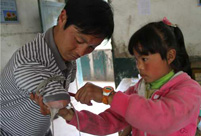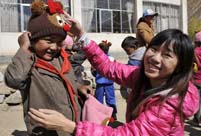Establishing the political consultation system
The system of multi-party cooperation and political consultation is a basic political system of China, and socialist consultative democracy is an important form of people's democracy in China. On December 20, 1959 the First Session of the First Tibet Autonomous Regional Committee of the Chinese People's Political Consultative Conference (CPPCC) was held in Lhasa, marking the creation of this Committee. It also marked the establishment in Tibet of the system of multi-party cooperation and political consultation under the leadership of the Communist Party of China (CPC), a system that ensures that all the people in Tibet, from all strata and all circles, can fully voice their opinions and play their roles in political life. The CPC Committee and People's Government of the Tibet Autonomous Region have incorporated political consultation into their decision-making procedure, conducting extensive consultation to solicit the local people's opinions on major issues in social and economic development and concrete problems concerning the people's interests. The CPPCC Tibet committee members come from all circles and all ethnic groups, and are elected on an extensive basis to represent their respective circles or ethnic groups. Uniting all people's societies and people from all ethnic groups and all circles, they diligently perform their duties in political consultation, democratic supervision, and participation in the deliberation and administration of state affairs, and make suggestions based on in-depth investigations or research; as an important driving force for Tibet, they are making great contributions to economic development and social progress in the autonomous region. At present, Tibet has 29 members on the CPPCC National Committee, including 26 from the Tibetan and other ethnic minorities. From 2008 to 2012 the Tenth Tibet Autonomous Regional Committee of the CPPCC received 1,507 proposals and has replied to them all.
Implementing the system of regional ethnic autonomy
To carry out regional ethnic autonomy in areas where ethnic minorities live in compact communities is a basic political system of China, and also a basic policy to handle problems concerning ethnic minorities in China. All ethnic groups in Tibet enjoy all the political rights prescribed in the Constitution of the People's Republic of China and other laws. In addition, they enjoy political rights specially drawn up for ethnic autonomous regions. According to the Constitution and the Law on Regional Ethnic Autonomy, the Tibet Autonomous Region enjoys extensive rights of autonomy, including legislative power, flexible enforcement of relevant state laws, right to use the spoken and written languages of the ethnic minorities, right of personnel management, right of fiscal management, and right to independently develop culture and education.
Since the Tibet Autonomous Region was set up in 1965, the regional people's congress and its standing committee have made over 290 local laws and regulations, or resolutions and decisions of a legislative nature, and formulated measures for the flexible implementation of some state laws in Tibet in order to suit local conditions. For example, Tibet made alternative regulations in 1981 and 2004, in which the legally marriageable ages for men and women were both reduced by two years from what was prescribed in the Marriage Law of the People's Republic of China, and polyandrous and polygynous relations that had existed before the regulations took effect would be allowed to continue if no one involved proposes dissolution of the marriage. Another example is that in addition to the national holidays, Tibet has other public holidays, mostly traditional Tibetan festivals such as the Tibetan New Year and Shoton Festival. In the contingent of local officials, 70.53 percent are from the Tibetan and other ethnic minorities, and among county and township leaders, 73.03 percent are from the Tibetan and other ethnic minorities. Since the Tibet Autonomous Region was set up, all the chairpersons of the standing committee of the regional people' s congress and of the regional people' s government have been elected from the Tibetan ethnic group. The system of regional ethnic autonomy ensures that political, economic, social and cultural rights of the people of all ethnic groups in Tibet are effectively protected.
 |  |
 No news of survivors in Lao Airlines crash
No news of survivors in Lao Airlines crash Five fighters in flight training
Five fighters in flight training London mayor hails free trade, subway system on China tour
London mayor hails free trade, subway system on China tour Different eye catching shows at housing fairs in China
Different eye catching shows at housing fairs in China Chalk it up to great courage
Chalk it up to great courage Tibetan girl helps mobilize volunteers onlin
Tibetan girl helps mobilize volunteers onlin Lingerie show dazzles Wuhan Motor Show 2013
Lingerie show dazzles Wuhan Motor Show 2013  Chinese screen goddesses from Beijing Film Academy
Chinese screen goddesses from Beijing Film Academy  Weekly Sports Photos
Weekly Sports Photos Bayi Parachute Team of PLA Air Force
Bayi Parachute Team of PLA Air Force World has never been dark-- a blind kid’s life in Tibet
World has never been dark-- a blind kid’s life in Tibet Change to law may make it easier to sue polluters
Change to law may make it easier to sue polluters UNESCO world heritage site: Montale Tower
UNESCO world heritage site: Montale Tower U.S. Senate leader announces bipartisan deal
U.S. Senate leader announces bipartisan deal Fiber-optic wedding dress show shinning in Suzhou
Fiber-optic wedding dress show shinning in Suzhou Day|Week|Month